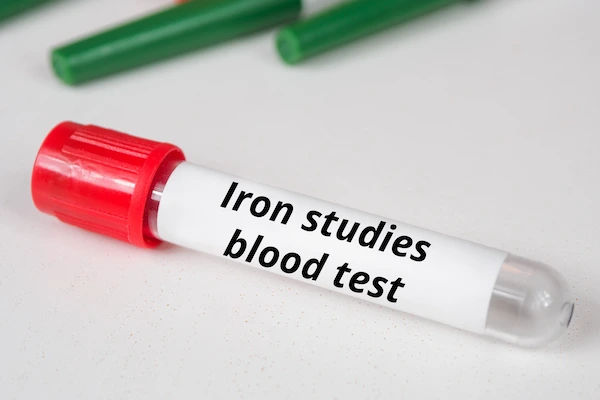Constant Mood Changes? These Tests Might Help
Experiencing constant mood changes? Hormonal imbalances or nutrient deficiencies could be the cause. Discover essential tests like thyroid, vitamin B12, and cortisol to help identify underlying issues.

Written by Dr. Rohinipriyanka Pondugula
Reviewed by Dr. Md Yusuf Shareef MBBS
Last updated on 9th Sep, 2025
.webp?tr=q-80,f-webp,w-350,dpr-2,c-at_max 700w)
If your emotions shift suddenly and often, or if you find yourself feeling unusually irritable, anxious, or down, it's more than just a bad day. Constant mood changes can affect your daily life, your relationships, and your sense of well-being. While life events and stress can influence how you feel, mood swings that seem out of proportion or have no clear cause may signal something deeper. Hormonal shifts or vitamin deficiencies are often overlooked but can play a major role in emotional health.
Trying to just push through or hoping the feelings will pass might offer short-term relief, but it doesn’t solve the problem if your body is out of balance. Fortunately, specific blood tests can offer crucial insights, helping your doctor understand what might be driving your constant mood changes and guiding you towards an accurate diagnosis and an effective solution for greater emotional balance. In this guide, we’ll explore the key tests that may help explain your mood swings and how they can support better emotional balance over time.
Noticing Shifts in Your Mood? Here’s What That Might Mean
Mood changes are a natural part of life, but when they become more intense, frequent, or long-lasting than usual, they may signal a deeper issue. These emotional shifts can appear in several forms:
- Irritability or feeling on edge
- Sudden episodes of sadness or tearfulness
- Feeling anxious, tense, or overwhelmed
- Trouble concentrating or feeling mentally foggy
- Persistent fatigue that makes it difficult to manage emotions
- Becoming more emotionally sensitive than normal
While many people chalk up these symptoms to a busy schedule or temporary stress, it’s important to pay attention when mood changes begin to interfere with your daily life or emotional well-being.
What Could Be Causing These Emotional Changes?
Mood is influenced by a complex relationship between brain chemistry, hormone levels, sleep patterns, and overall physical health. Several common factors may contribute to noticeable changes in mood:
- Long-term stress can affect your brain’s natural balance of mood-regulating chemicals like serotonin and dopamine.
- Sleep problems can make it harder for your brain and body to reset emotionally, leading to irritability or a low mood.
- Nutritional imbalances, including diets low in essential vitamins or minerals, may impact how your brain functions and how you feel.
- Major life changes that involve hormonal shifts—such as menstruation, pregnancy, perimenopause, or menopause—can affect emotional stability.
- Lack of physical activity or excessive caffeine and alcohol may also alter your brain's chemistry over time.
If lifestyle changes are not helping and emotional symptoms remain difficult to manage, it may be time to look deeper. In many cases, blood tests that assess hormone levels, vitamin deficiencies, or other internal factors can help explain ongoing mood concerns and guide appropriate care.
When to Consider Tests for Constant Mood Changes?
If your mood changes are a persistent challenge, especially if they significantly impact your daily functioning, relationships, or come with other concerning symptoms, it's time to talk to your doctor about further investigation, including specific tests. Consider these tests if you experience:
- Persistent Emotional Swings: If you consistently feel like your moods are unpredictable for weeks or months, beyond typical premenstrual symptoms.
- Significant Impact on Life: If your mood changes are affecting your work, school, relationships, or overall enjoyment of life.
- Unexplained Physical Symptoms: If your mood changes are accompanied by:
Irregular menstrual periods, heavy bleeding, or severe period pain (especially relevant for women and teens).
Persistent fatigue or changes in energy levels.
Unexplained weight changes (gain or loss).
Sleep disturbances (difficulty falling or staying asleep).
Changes in appetite or digestive issues.
Hair thinning, skin changes, or excess hair growth. - Moods that are Unresponsive to Self-Care: If despite trying stress reduction, better sleep, and healthy eating, your moods remain unstable.
If any of these sound familiar, discussing specific blood tests and other analyses with your doctor can help pinpoint the exact underlying cause and lead to a more effective, personalised plan for emotional balance.
Key Blood Tests That Can Reveal Why Your Moods Are Changing
When persistent mood changes leave you feeling overwhelmed, specific blood tests can help your doctor investigate imbalances that might be disrupting your emotional stability. These tests offer vital clues about what might be happening inside your body.
- Estrogen Levels: Fluctuations or imbalances in estrogen can directly impact mood, leading to irritability, anxiety, or feelings of sadness. These shifts are common during menstrual cycles, puberty, pregnancy, and perimenopause.
- Progesterone Levels: Progesterone also affects mood and has a calming effect. Low progesterone, especially in relation to estrogen, can contribute to anxiety, irritability, and sleep disturbances, which then impact mood.
Check Your Progesterone Level Here
- TSH (Thyroid-Stimulating Hormone), T3, T4: These tests check how well your thyroid is working. An underactive thyroid (hypothyroidism) can slow down your body's processes, leading to symptoms like depression, fatigue, and difficulty concentrating. Conversely, an overactive thyroid (hyperthyroidism) can make you feel restless and anxious, contributing to insomnia.
- Vitamin D: Often recognised for its role in bone health, Vitamin D is also important for sleep regulation and mood. A deficiency in Vitamin D has been strongly linked to mood disorders, including depression and increased irritability. A simple blood test can check your levels
- Cortisol Levels: Cortisol is your body’s primary "stress hormone," which helps you wake up and respond to stress. However, if cortisol levels are abnormally high, particularly at night, they can interfere with your ability to fall or stay asleep, affecting your mood. A cortisol blood test can help assess your body's stress response and internal clock.
- Melatonin Levels: Melatonin is known as the "sleep hormone" because it signals to your body that it’s time to sleep. Low levels of melatonin at night can make it difficult to initiate sleep, and abnormal timing of its release can disrupt your natural sleep-wake rhythm, impacting your mood.
- Vitamin B12 Levels: Vitamin B12 is essential for nerve function and the production of brain chemicals that affect mood. A deficiency can lead to fatigue, brain fog, and mood changes, including irritability and depression.
- Iron Studies (Ferritin, Serum Iron): Iron is essential for energy production and carrying oxygen to the brain. Low iron levels, even without full-blown anaemia, are commonly associated with fatigue, weakness, and can contribute to low mood, irritability, and restless legs syndrome (RLS), which disrupts sleep.
The results from these specific tests, combined with your symptoms, medical history, and a thorough lifestyle assessment, will help your doctor accurately diagnose the underlying causes of your constant mood changes. This allows for a targeted treatment plan designed to bring you lasting emotional balance and improved well-being.
Get Tested Easily with Apollo 24|7
When your doctor recommends diagnostic tests to uncover the hidden factors affecting your moods, choosing a trusted and convenient testing provider is paramount. Apollo 24|7 simplifies this process by offering a wide range of reliable lab tests. With accurate results delivered quickly, you and your doctor can work together to identify any underlying factors contributing to your emotional fluctuations and plan the right path to greater balance.
Here’s why choosing Apollo 24|7 for your mood change investigations is a smart step:
- Comprehensive Test Panels: Apollo 24|7 facilitates access to a broad spectrum of diagnostic tests directly relevant to mood changes, including crucial panels like the Estrogen Blood Test, Progesterone Test, Thyroid Function Tests, and specific Vitamin D, B12, and Iron levels.
- NABL-Accredited Labs: Tests are conducted in high-quality labs certified by the National Accreditation Board for Testing and Calibration Laboratories (NABL), ensuring trusted accuracy and reliability for your results.
- Home Sample Collection: No need to travel; get blood samples collected conveniently from your home at a time that suits you, offering privacy and comfort.
- Easy Online Booking: Book your tests effortlessly through the user-friendly Apollo 24|7 app or website with just a few clicks.
- Fast Digital Reports: Receive secure, detailed reports swiftly online, delivered directly to your device, ready for your doctor to review.
- Trusted Brand: Benefit from the trusted expertise and healthcare legacy of Apollo Hospitals Group, one of India’s most respected medical networks.
By choosing Apollo 24|7, you gain access to high-quality, reliable, and convenient diagnostic services that can significantly streamline your journey towards understanding and effectively managing your constant mood changes.
Get These Tests To Get A Yourself Checked up
Conclusion
Persistent mood changes are not just emotional reactions to daily stress; they can be signs that your body is out of balance. Hormones, thyroid activity, and essential vitamins and minerals all play vital roles in how your brain regulates emotions. If feelings of irritability, sadness, anxiety, or low energy continue despite lifestyle changes, testing your internal health may provide much-needed answers. Blood tests that evaluate hormone levels, thyroid function, and nutrients like vitamin D, B12, and iron can help your doctor identify factors that may be affecting your mental and emotional well-being. Understanding the root cause allows for a treatment plan that addresses more than just symptoms. It opens the door to long-term improvement in your mood, clarity, and quality of life.



.webp)


